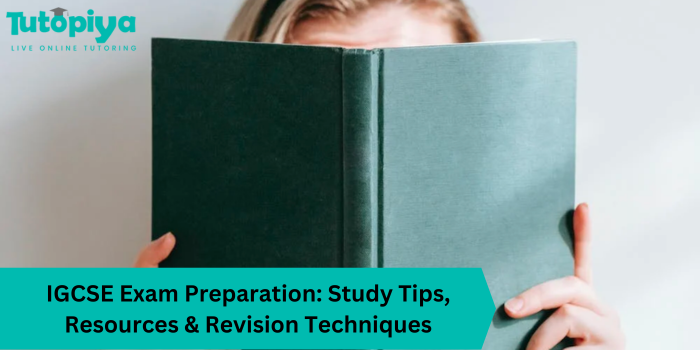IGCSE Exam Preparation: A Comprehensive Study Guide for IGCSE Students
For students typically between the ages of 14 and 16, the International General Certificate of Secondary Education (IGCSE) is a globally recognised credential. The IGCSE programme, which is administered by the University of Cambridge International Examinations (CIE), aims to give students a thorough education.
This blog aims to provide students preparing for the IGCSE exams with an extensive study guide. It provides advice on how to make the most of resources, comprehend the curriculum, plan productive study sessions, and achieve academic success in particular subject areas.
Explore: Free IGCSE Exam Resources
Understanding IGCSE curriculum

The International General Certificate of Secondary Education (IGCSE), administered by University of Cambridge International Examinations (CIE), is a curriculum that is recognised globally and offers academic excellence. For students between the ages of 14 and 16, the IGCSE offers a comprehensive and flexible educational framework that covers a wide range of subjects.
Students can tailor their education to suit their individual interests and career goals by choosing from a wide range of subjects, such as math, science, English, humanities, and languages.
Must Read: IGCSE in Singapore | IGCSE exams in Singapore
IGCSE places a strong emphasis on developing analytical skills, critical thinking, and the application of knowledge in real-world situations. Beyond mere memorization, the curriculum encourages students to comprehend ideas thoroughly and use them in real-world contexts.
Must Read: Master the IGCSE: Your Complete Guide to Success
The international perspective of the curriculum guarantees that students acquire a comprehensive comprehension of diverse cultures and worldwide concerns. It encourages a well-rounded education and equips students to live as responsible, informed, and global citizens. The IGCSE curriculum is therefore highly respected by colleges and employers throughout the world.
Students must have a solid understanding of the curriculum, its goals, and the particular requirements of each subject in order to perform well on the IGCSE exams. This information serves as the cornerstone for efficient study schedules, thoughtful test preparation, and general success in overcoming the obstacles associated with IGCSE education.
Creating a Study Schedule

Organized Learning: A study plan organizes your study materials and schedules, preventing last-minute cramming. It ensures a systematic approach to covering all subjects and topics, reducing the risk of overlooking important content.
Consistency and discipline: A structured plan establishes a routine, fostering consistency and discipline in your study habits. Consistent study sessions enhance long-term retention and understanding of concepts.
Goal Setting: The plan allows you to set realistic goals, breaking down larger objectives into manageable tasks. Achieving small goals boosts motivation and provides a sense of progress.
Time Efficiency: With a plan in place, you can allocate time efficiently to each subject based on its importance and your proficiency level. It helps avoid spending too much time on one topic at the expense of others.
Start today: IGCSE Tuition SG | Tutor For English, Maths, Science Revision
Tips for Time Management

Prioritize Subjects:
Identify subjects that require more attention or are challenging for you.
Allocate more time to these subjects, ensuring a balanced focus across all areas.
Must Read: IGCSE Syllabus: How To Choose the Right Subjects for IGCSE
Break Down Study Sessions:
Break study sessions into smaller, focused intervals with short breaks in between.
Short, concentrated sessions are more effective than long, unfocused ones.
Create a Realistic Schedule:
Consider your daily routine, commitments, and energy levels when creating a schedule.
Be realistic about the time you can dedicate to studying each day.
Use Technology:
Leverage digital tools and apps to create interactive schedules with reminders.
Set alarms or notifications to signal the end of each study session or break.
Include Review Sessions:
Allocate time for regular review sessions to reinforce what you’ve learned.
Reviewing previous material helps in long-term retention and understanding.
Adjust as Needed:
Periodically assess your progress and adjust the study schedule as needed.
Be flexible to accommodate unexpected events or changes in priorities.
Balance Study and Relaxation:
Factor in leisure activities and relaxation to prevent burnout.
A well-balanced schedule promotes overall well-being and sustained focus.
Enroll Today: Tutopiya: Online Tutoring for IGCSE, A Levels and IB
Essential Study Resources

Online Learning Platforms:
Tutopiya: Offers video tutorials and practice exercises across various subjects.
BBC Bitesize: Provides interactive lessons, quizzes, and revision materials.
Coursera and edX: Platforms offering online courses from top universities.
Official CIE Resources:
Access past papers, marking schemes, and examiner reports on the official Cambridge website.
Official resources ensure alignment with the exam format and expectations.
Subject-Specific Websites:
Mathway: A tool for solving math problems step-by-step.
Chemguide: A comprehensive guide for A-level chemistry, beneficial for IGCSE students.
Interactive Learning Apps:
Quizlet: Create flashcards for self-assessment and vocabulary building.
Duolingo: Useful for language subjects, enhancing grammar and vocabulary.
Online Forums and Study Groups:Join platforms like The Student Room to discuss queries, share resources, and gain insights from peers.Engaging with a community can provide varied perspectives and valuable study tips.
Must Read – Free IGCSE Notes and Revision: 11 Top Websites to Help You Ace Your Exams
Subject-Specific Advice
Math:
Consistently Practice: To grasp mathematical concepts, one must practice frequently. Use interactive learning environments such as Tutopiya.
Enroll: 1 to 1 Math Tuition: Best Online Maths Tutors in Singapore
Recognise Ideas: Prioritize comprehension of the fundamental ideas over memorization by rote.Seek explanations from instructors or internet sources on any difficult subjects.
Utilize Previous Papers: Practice past exams so you are comfortable with the format of the test.Determine recurring themes in questions and focus on honing your problem-solving techniques.
Must Read: IGCSE Maths: Syllabus, Revision Notes & Preparation Tips
Science:
Practical Application: Relate theoretical concepts to real-world applications. Perform experiments when possible to enhance understanding.
Note-taking: Create concise notes summarizing key scientific principles. Visual aids and mind maps can aid in better retention.
Effective Revision: Use flashcards to review scientific terminology and definitions. Focus on areas of weakness during revision sessions.
Start Today: Science Tuition: Best Online Science Tutors in Singapore
English:
Reading Widely:Read a variety of texts, including fiction, non-fiction, and poetry. Analyze the author’s style, themes, and literary devices used.
Writing Practice:Regularly practice essay writing to improve coherence and structure. Seek feedback from teachers or peers to refine your writing skills.
Vocabulary Enhancement:Expand your vocabulary through daily reading and note down unfamiliar words.Use new words in your writing to reinforce learning.
Enroll today: English Tuition: Best Online English Tutors in Singapore
Typical Mistakes Made When Procrastinating and the Way to Avoid Them
To combat procrastination, establish a system of rewards, divide work into digestible chunks, and make realistic goals.
Insufficient Organization,Make use of apps or planners to help you keep track of deadlines and assignments while also keeping your workspace neat and orderly.
Putting the edit aside:To improve comprehension and memory, go over previously taught material regularly.
Separation:Take part in study groups or online forums to exchange ideas and overcome obstacles with other members of the group.
Must Read: How to stop procrastinating and focus on the task at hand
Effective Revision Techniques
Active Recall:
Test yourself on key concepts without looking at your notes.
Use flashcards or create questions to prompt recall.
Must Read: Active Recall and Spaced Repetition: How to study effectively
Mind Mapping:
Create visual representations of interconnected concepts.
This technique aids in organizing information and improving memory.
Teaching Others:
Teach a concept to a friend or family member.
Explaining concepts reinforces your understanding and identifies areas of weakness.
Practice with Past Papers:
Simulate exam conditions by solving past papers.
Analyze your performance, identify weak areas, and focus on improving them.
Must Read: IGCSE Exam Tips: 7 Effective Revision Methods for Students
IGCSE Exam Techniques

Examine the instructions thoroughly:
Read and comprehend each question’s instructions carefully.
Before you begin to prepare your response, make sure you understand the question.
Time Allotted:
Exam time should be allotted according to how many points are given for each question.
Sort questions into priority lists according to their significance and your advantages.
Structure for Reaction:
Provide a brief beginning, body, and conclusion for each response.
For clarity, use numbered lists or bullet points, particularly in maths and science-related subjects.
Examine your responses:
If you have time, go over your responses and correct any mistakes or places that need work.
Make any necessary changes, and make sure your answers are succinct and understandable.
Online Homeschooling:
Online homeschooling provides students with a customized and adaptable learning environment. These platforms offer interactive lessons, certified teachers, and customisable learning plans, all with a curriculum that is in line with national and international standards.
The flexibility to fit their studies around personal obligations, get individualized attention, and interact with multimedia materials are all advantageous to students.
For those who prefer a customized educational approach, online homeschooling is especially beneficial because it enables them to concentrate on particular areas of interest and advance at their speed.
Must Read: Homeschooling in Singapore: Benefits, Challenges, Online Resources
Online Tuition from Tutopiya
Tutopiya stands out as a leading platform for online tuition, specializing in the IGCSE curriculum. With experienced tutors and personalized, one-on-one sessions, Tutopiya offers targeted support for students seeking to excel in their exams.
The flexible scheduling of sessions allows students to maintain a balanced study routine, while the real-time communication and interactive whiteboard features create an engaging learning environment.
Tutopiya’s focus on individualized attention and expertise in IGCSE subjects make it a valuable resource for students looking to address specific challenges, clarify doubts, and receive guided assistance for optimal exam preparation.
Enroll today: IGCSE Tuition SG | Tutor For English, Maths, Science Revision
IGCSE Exam Prep FAQs
Q. When should I start revising for IGCSE exams?
A. Start revising several months before exams to allow for thorough coverage and practice.
Q. How can I overcome exam anxiety?
-
- Practice mindfulness and relaxation techniques.
- Break down study sessions into manageable chunks to prevent overwhelm.
Q. Is online tutoring effective for IGCSE preparation?
A. Yes, online tutoring provides personalized support, flexibility, and access to experienced educators.
Q. What resources are best for exam practice?
A. Utilize official CIE past papers and online platforms like Tutopiya for varied practice.
